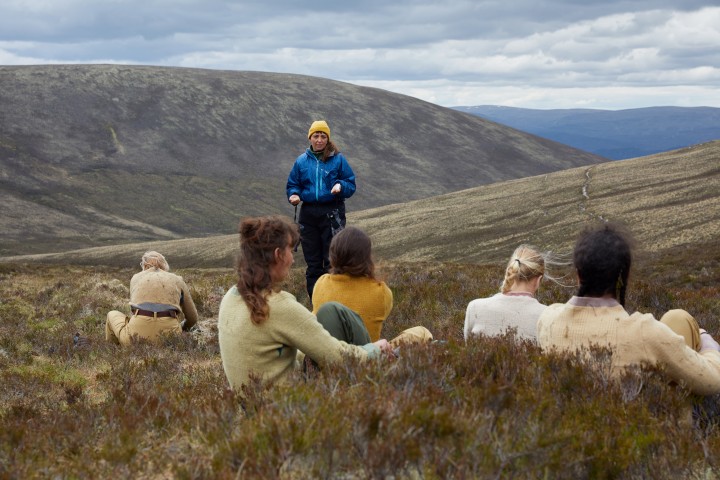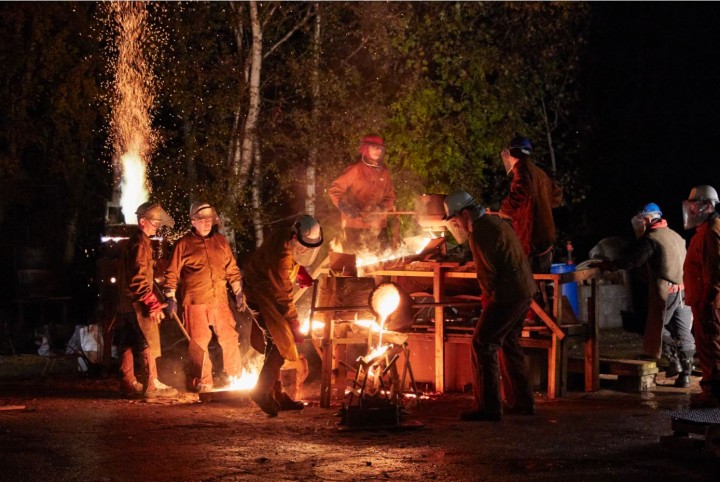Scottish Art News
Latest news
Magazine
News & Press
Publications
Scottish Art Unlocked: Sam Trotman on the Scottish Sculpture Workshop
By Sam Trotman, 20.07.2020

The Scottish Sculpture Workshop is an impressive complex of studios and facilities located in Lumsden, Aberdeenshire, which attracts makers from across Scotland and further afield. Despite the current closure of its workshops, SSW remains active; co-ordinating and supporting networks on a local, national and international level. Director Sam Trotman tells us more.
Like many organisations, Sculpture Sculpture Workshop closed down quickly in mid-March. Before doing this, we ensured our residency artists could return to their homes in Scotland and further afield. Usually we run a packed programme throughout the summer; this year we would have been hosting residencies, running courses, co-curating an international assembly and supporting a range of artist led projects, as well as running regular open workshop sessions. Instead we have had to postpone or cancel much of this work, but we have also found alternative ways to support our local community.
Since the lockdown we have coordinated a mutual aid group with local volunteers. We are based in Lumsden, a small, rural village of around 400 people with many homes spread across vast distances. With no public transport running it is important that we can continue to offer support in different ways whilst our site is closed.
We are glad to be part of the commissioning team behind Harry Josephine Giles and Sasha Saben Callaghan’s Not Going Back To Normal project produced by Collective which was launched in May. The pandemic has magnified inequalities for so many artists but particularly for disabled artists as many face long term shielding and loss of income. The results of this project, a radical manifesto for and by disabled artists, along with other artist-led actions that are taking place at the moment need to be central in all of our organisation’s plans during our recovery periods of Covid-19.
During this difficult time, collaboration across Scotland's arts sector has been quite inspirational. In particular we are working closely with our colleagues from Scotland's Workshops, a network of 11 visual arts production facilities all across the country and SCAN (Scottish Contemporary Art Network). Together we sit on the Creative Industries Advisory Group and offer insight on the reopening guidelines for studios and workshops. From this it is clear that operating within workshops and implementing social distancing measures is going to be a struggle. Together as a network we share practice and are advocating for support not just in the short term but over a longer period as we develop new strategies to continue working with artists whilst living with the virus.
 Image courtesy the SSW.
Image courtesy the SSW.
As well as working with our Scotland-based partners we have continued to work with our colleagues across Europe to develop ideas and approaches for what comes next. We are part of two Creative Europe projects - BE PART and RESHAPE. Both these projects explore how we work with communities and artists to reshape arts infrastructures and governance. This collaborative research calls for a paradigm shift; a move away from the dominant cultural canons of artistic excellence, growth mentality, nation state representation and of organisational structures that make artists the most precarious within them. Instead we are reimagining the arts as a movement for the collective survival: of the living (beings, planet and their inter-relations), of the free (expression, identity, movement), of justice (just transitions, fairness, solidarity). This research will underpin how we move forward at SSW but I hope it will also inform wider conversations and actions in the sector.
Embracing all of this we have managed to submit plans for the redevelopment of our workshops, in collaboration with Collective Architecture. These plans offer multiple shared spaces for collective learning and will make our workshops and accommodation accessible and more environmentally sustainable. We know capital fundraising for this will be even more difficult now, with many trusts and foundations closing their capital grant streams in order to support more immediate challenges caused by the pandemic, but we need to find support to keep our buildings going into the future.
The Covid-19 pandemic made us pause and we must start in another way. I hope as we do this we rebuild porous, queer, feminist, anti-racist, post-human organisations that are collectively governed and rooted in artists needs and practice.
For more infomation on the SSW visit here.
This article is part of a series from the Fleming Collection in discussion with the Scottish art scene to find out how the Covid-19 pandemic and subsequent lockdown has impacted programmes and practices, and how it might reshape the art scene in the future. For more, read words from artist Hanna Tuulikki, Kate Gray on Collective and Tina Fiske on CAMPLE LINE.




